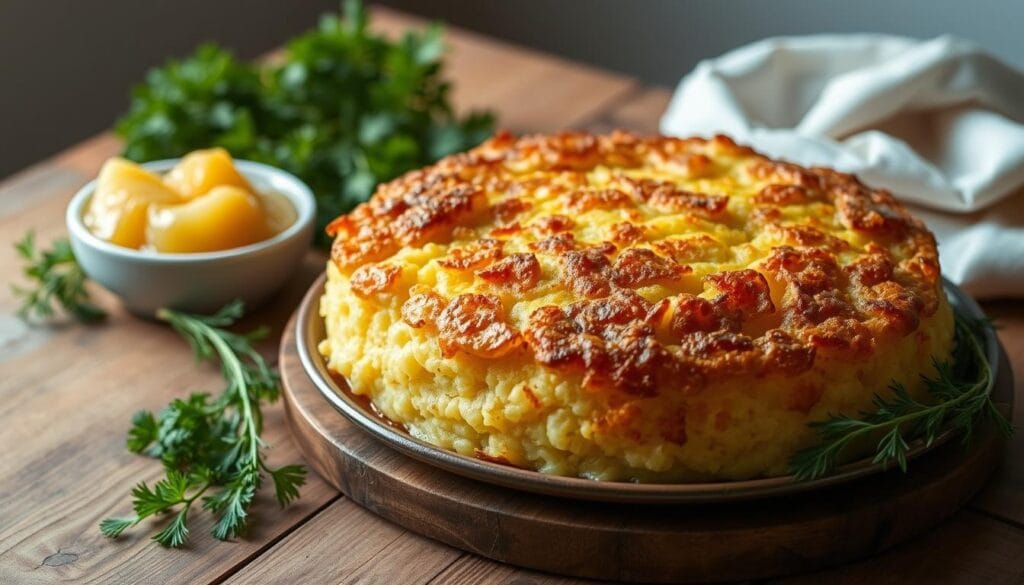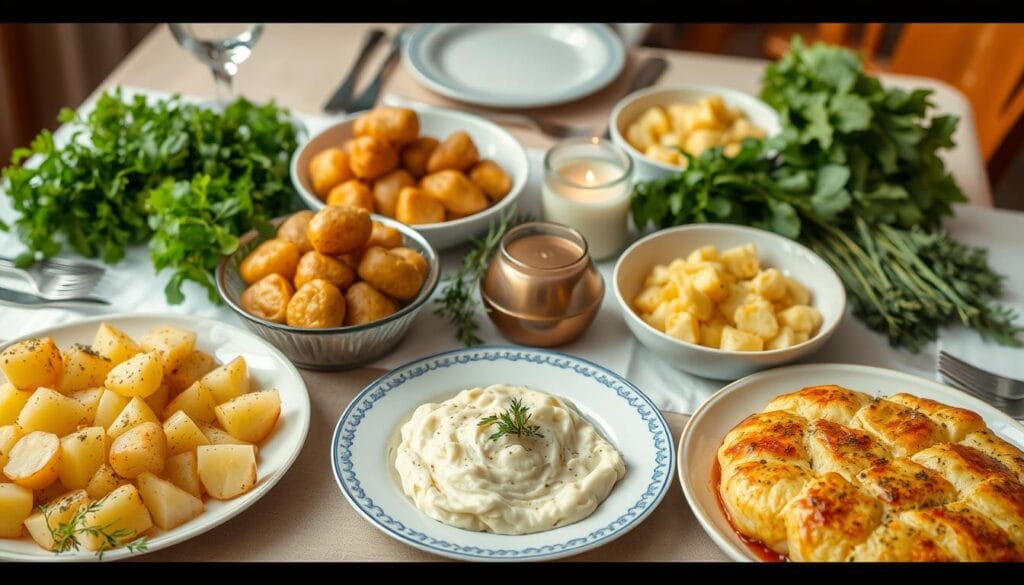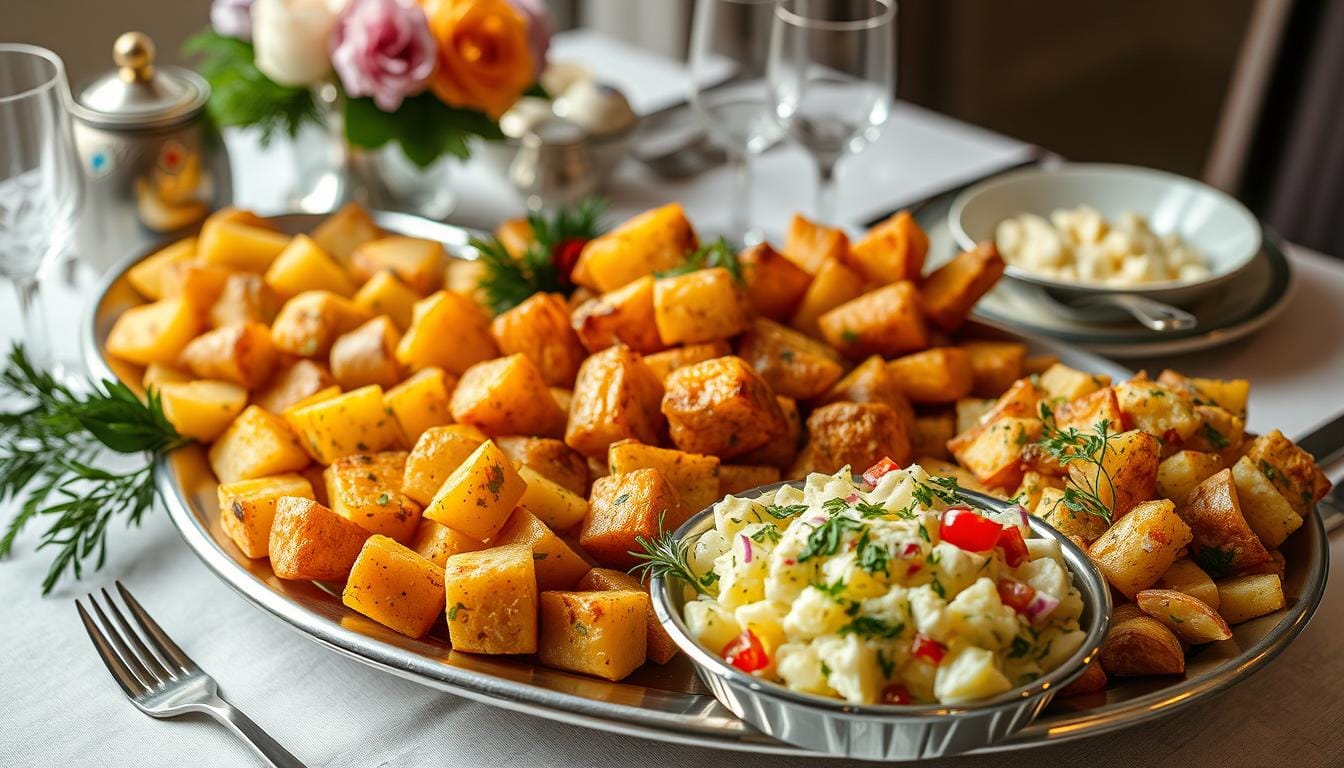Reading time: 10 minutes
Growing up in a Jewish household, Passover was a time of strict dietary rules. My grandmother would prepare our kitchen with care, making sure it was kosher. We always talked about Can Jews Eat Potatoes During Passover?
Potatoes are a great choice for Passover. They’re nutritious and can make your holiday meals special. Can Jews Eat Potatoes During Passover? Absolutely! Potatoes are a key part of Jewish traditions, offering a tasty and flexible option for those following Passover’s dietary rules.
Table of contents
- Potatoes and Passover Dietary Laws
- Traditional Potato Dishes for Passover
- Creative Passover Potato Recipes
- Nutritional Benefits of Potatoes During Passover
- Common Mistakes When Cooking with Potatoes for Passover
- Cultural and Regional Variations in Passover Potato Recipes
- Serving Suggestions for Passover Potato Dishes
- Preparing Your Kitchen for Passover Cooking
- Conclusion
- FAQs
Overview of Passover Dietary Traditions
Jewish laws during Passover are complex and rooted in history. The main goal is to avoid chametz, or leavened grains, seen as spiritually impure. This makes whole foods like potatoes key to Passover cooking.
- Eliminate wheat, barley, rye, oats, and spelt products
- Focus on unleavened foods
- Prepare meals using alternative ingredients
The Role of Potatoes in Jewish Culinary Practices
Potatoes became essential for Jewish communities during Passover. Introduced in the 16th century, they were a versatile, kosher-friendly food that provided vital nutrition.
Potatoes offer a blank canvas for creativity in Passover cooking, bridging traditional restrictions with innovative cuisine.
For more insights into Passover dietary restrictions, explore What Are the 5 Forbidden Foods on Passover, a guide to understanding chametz and its implications for the holiday.
Why Potatoes Became a Staple for Passover Meals
| Reason | Significance |
|---|---|
| Nutritional Value | High in carbohydrates and essential nutrients |
| Kosher Compliance | Naturally free from forbidden grains |
| Versatility | Can be prepared in multiple ways |
Are potatoes kosher for Passover? Absolutely! They are a perfect choice for keeping dietary laws while enjoying tasty, fulfilling meals during this important holiday.
Potatoes and Passover Dietary Laws
Passover’s dietary rules can be tricky to follow. Knowing the rules about potatoes and chametz makes it easier to cook tasty meals that follow tradition.
Are Potatoes Considered Chametz?
Chametz refers to leavened foods made from grains like wheat, barley, rye, oats, and spelt. Potatoes, being a vegetable, fall outside this category and are universally accepted for Passover.
Why Potatoes are Kosher for Passover
Potatoes are special in Passover’s dietary laws. They’re gluten-free and not part of kitniyot, so most Jewish families can eat them during the holiday.
Understanding Kitniyot and Chametz Rules
It’s important to know the difference between kitniyot and chametz for Passover cooking. Chametz includes grains that have risen. Kitniyot includes foods like:
- Rice
- Corn
- Legumes
- Beans
“Potatoes provide a delicious and versatile alternative during Passover, bridging traditional dietary restrictions with culinary creativity.” – Rabbi David Cohen
| Food Category | Passover Status |
|---|---|
| Wheat | Chametz (Forbidden) |
| Barley | Chametz (Forbidden) |
| Potatoes | Allowed |
| Rice | Kitniyot (Varies by tradition) |
Different Jewish traditions have different views on potatoes and Passover. Ashkenazi Jews usually allow potatoes, but Sephardic communities might have different rules. Always check with your local rabbi for specific Passover dietary advice.
For an exploration of kosher and culinary creativity, see how potatoes compare to other ingredients, like Langostinos in flavor and versatility.
Traditional Potato Dishes for Passover
Passover is a time filled with cherished culinary traditions. Potatoes are a big part of many classic Jewish recipes. From crispy potato latkes to creamy mashed potatoes, these dishes add warmth and comfort to the holiday table.
Potato Kugel: A Classic Passover Delight
The beloved potato kugel is a must in classic Jewish recipes. It’s a dish that’s crispy on the outside and soft on the inside. It’s a true Passover staple. Families often have their own special recipe that’s been passed down through generations.

Comfort Foods: Mashed Potatoes with a Passover Twist
Traditional passover mashed potatoes are a creamy side dish everyone loves. Here’s a simple recipe to make your Passover meal special:
- Use extra-virgin olive oil instead of butter
- Season with kosher salt and fresh herbs
- Avoid dairy for a pareve preparation
Potato Latkes for Passover: A Holiday Favorite
Potato latkes for Passover are a crowd-pleaser. They bring joy to the holiday table. These crispy potato pancakes can be served with:
- Homemade applesauce
- Kosher-for-Passover sour cream
- Fresh herbs as a garnish
“A good potato latke is like a warm hug from your grandmother – comforting and full of love.”
| Potato Dish | Preparation Time | Difficulty Level |
|---|---|---|
| Potato Kugel | 45 minutes | Medium |
| Mashed Potatoes | 30 minutes | Easy |
| Potato Latkes | 40 minutes | Medium |
The key to perfect Passover potato dishes is using fresh ingredients and cooking with love. Each recipe tells a story of tradition, family, and the enduring spirit of Jewish culinary heritage.
Creative Passover Potato Recipes
Passover cooking can be both challenging and exciting. It’s a time to create delicious dishes that fit dietary restrictions. Potatoes are your best friend, adding versatility and comfort to your Passover recipes.
Innovative cooks have found many ways to make potatoes into delightful Passover dishes. You can find plenty of tasty options, whether you’re looking for passover recipes with potatoes or want to use potatoes as a matzo meal substitute.
Using Potatoes as a Matzo Meal Substitute
Potatoes can change the game when replacing traditional matzo meal. Here are some creative ways to use them:
- Mash potatoes finely to act as a binding agent like matzo meal
- Grate potatoes for a crispy coating on proteins
- Blend boiled potatoes for a smooth base in casseroles
Potato-Based Alternatives for Passover Bread
Craving bread during Passover? Potato-based alternatives can fulfill your carb cravings while being kosher. Try these innovative options:
- Potato flatbread made with mashed potatoes and potato starch
- Potato-based pizza crust
- Crispy potato pancakes as a bread substitute
Sweet Potato Recipes for Passover
Sweet potatoes add a delightful twist to traditional Passover desserts. Here are some tempting options:
| Dessert | Preparation Time | Serving Size |
|---|---|---|
| Sweet Potato Pudding | 45 minutes | 8-10 people |
| Sweet Potato Chocolate Cake | 1 hour | 12-15 people |
| Caramelized Sweet Potato Pie | 90 minutes | 10-12 people |
“Potatoes are not just a side dish during Passover – they’re a culinary canvas for creativity!” – Kosher Cooking Experts
The key to successful Passover cooking is experimentation and embracing holiday cuisine’s unique challenges. Your potato-based dishes can be the highlight of your Seder table!
For innovative recipes that blend traditional and modern flavors, check out this guide to versatile comfort foods like French onion meatloaf.
Nutritional Benefits of Potatoes During Passover
Passover can be tough on our diets, but potatoes are a nutritional gem. They are a great choice for healthy Passover meals.
Are potatoes good for Passover meals? Yes, they are! These versatile veggies offer a big nutritional boost for the holiday.
Potatoes as a Nutritional Powerhouse
- Rich in vitamin C and B6
- Excellent source of potassium
- High in dietary fiber
- Low in calories
Baking vs. Frying: Healthier Preparation Methods
Baking potatoes is better than frying. Baked potatoes keep more nutrients and need less oil. They’re perfect for those watching their health during Passover.
| Preparation Method | Calories | Nutrient Retention |
|---|---|---|
| Baking | 120-150 | High |
| Frying | 300-400 | Low |
Pairing Potatoes with Nutrient-Dense Foods
To get the most from potatoes, pair them with protein and veggies. Make balanced Passover meals that are full of nutrients and follow dietary rules.
“Let food be thy medicine and medicine be thy food” – Hippocrates
By picking smart cooking ways and pairing, potatoes can be a tasty, healthy part of your Passover diet.
Common Mistakes When Cooking with Potatoes for Passover
Cooking potatoes for Passover can be tricky, even for experienced home chefs. Knowing the common mistakes helps make sure your potato dishes are delicious and kosher. This will make your family happy during this special holiday.

Overcooking and Undercooking Potato Dishes
Mistakes in cooking potatoes for Passover often come from cooking them too long or too short. Getting the right texture is key:
- Use a timer to prevent overcooking
- Test potato tenderness with a fork
- Adjust cooking temperatures based on your recipe
Navigating Non-Kosher Ingredients
Choosing the right ingredients is key to keeping your dishes kosher. When making potato recipes, always check:
- Kosher certification on packaged ingredients
- Separate cooking utensils for Passover
- Avoid cross-contamination with non-kosher items
Balancing Flavors in Potato Recipes
Getting the flavors right in potato recipes takes creativity and knowing how to season. Here are some tips:
- Use fresh herbs like parsley and dill
- Experiment with kosher spices
- Balance salt and pepper carefully
“Passover cooking is an art of tradition and innovation” – Jewish Culinary Experts
Your Passover potato dishes can be both delicious and authentic. Avoid these common mistakes and use traditional cooking techniques.
Cultural and Regional Variations in Passover Potato Recipes
Jewish cooking traditions are rich and varied, even in potato dishes during Passover. Sephardic and Ashkenazi communities have their own ways of making potatoes, adding to the diversity of flavors and cooking methods.
Looking into regional Jewish potato dishes shows us how different Jewish communities cook. The way potatoes are made shows their culture and what ingredients are available locally.
Sephardic Potato Recipe Traditions
Sephardic Passover potato recipes are influenced by the Mediterranean. They often include:
- Vibrant spices like cumin and paprika
- Olive oil as a main cooking fat
- Herbs such as parsley and cilantro
- Techniques that mix Iberian and Middle Eastern cooking
Ashkenazi Potato Cooking Approaches
Ashkenazi potato traditions focus on hearty, rich dishes. Classic recipes include:
- Potato kugel with crispy edges
- Dense potato casseroles
- Simple, rustic potato side dishes
- Comfort-focused cooking styles
“Our potato recipes tell stories of migration, survival, and cultural resilience.” – Jewish Culinary Historian
Exploring these regional differences makes Passover cooking more meaningful. Each potato dish connects us to our ancestors, turning simple ingredients into something special.
Serving Suggestions for Passover Potato Dishes
Passover meals are filled with traditions, and potatoes are key in making tasty dishes. Think about how potato dishes can make your Passover meal special.
To pair potato dishes with Passover meals, know about flavors and dietary rules. Your aim is to make dishes that go well with the meal.
Pairing Potato Dishes with Traditional Passover Meals
Here are some tips for adding potato dishes to your Passover menu:
- Serve potato kugel with roasted chicken or brisket
- Use potato latkes as a crispy appetizer before the main course
- Create a potato and vegetable casserole as a hearty side dish
- Prepare mashed potatoes with fresh herbs for added flavor
How to Serve Potato Dishes as a Main Course or Side Dish
Potato dishes are very versatile during Passover. Here are some serving ideas:
- Turn potato latkes into a main course by adding poached eggs
- Make a potato and herb soup as a warm starter
- Roast potatoes with garlic and olive oil for a tasty side
“Potatoes are the unsung heroes of Passover cuisine, providing comfort and nutrition in every bite.”
Don’t forget to garnish your potato dishes with fresh herbs or olive oil. It will make them look and taste better.
Preparing Your Kitchen for Passover Cooking
To get your kitchen ready for Passover, you need to plan and pay attention to details. Making your kitchen kosher for Passover is key to keeping Jewish dietary traditions alive during this holiday.
Changing your kitchen for Passover means several important steps. These steps help make sure your kitchen is kosher and clean for cooking.
Ensuring Kosher Compliance with Potatoes
Here are some important tips for preparing potatoes for Passover:
- Thoroughly wash potatoes to remove any dirt or debris
- Inspect potatoes carefully for signs of sprouting or decay
- Use separate cutting boards for Passover
- Clean all utensils and surfaces with kosher-for-Passover cleaning products
Proper Storage of Passover Potatoes
Storing potatoes right during Passover is key to keeping them fresh. Keep potatoes in a cool, dark place with good air flow.
| Storage Location | Temperature | Expected Shelf Life |
|---|---|---|
| Cool, Dark Pantry | 45-50°F | 2-3 weeks |
| Refrigerator | 40°F | 1-2 months |
Essential Tools for Perfect Potato Cooking
Here are the must-have tools for making tasty Passover potato dishes:
- High-quality vegetable peeler
- Sharp paring knife
- Sturdy baking sheets
- Kosher-for-Passover roasting pans
- Ceramic or glass cooking dishes
“A well-prepared kitchen is the foundation of a meaningful Passover celebration.” – Jewish Culinary Tradition
Remember, careful preparation ensures your Passover potato dishes are both delicious and kosher.
Conclusion
Potatoes have become a key part of Passover meals, adding delicious variety to your holiday dishes. By trying out new Passover potato ideas, you can make old recipes exciting again. This way, you honor Jewish traditions and share special moments with your family. Can Jews Eat Potatoes During Passover? Absolutely! Potatoes are versatile and fit perfectly into kosher dietary rules.
Embracing the Versatility of Passover Potatoes
See potatoes as more than just a side dish. You can make everything from hearty kugels to crispy latkes. Can Jews Eat Potatoes During Passover? Yes, and their flexibility lets you follow kosher rules while enjoying a range of flavorful dishes. Invite your friends and family to share their potato recipes, starting a fun exchange of cooking ideas.
Encouraging Culinary Exploration
Each potato dish has a story behind it, filled with tradition, adaptation, and love. Asking Can Jews Eat Potatoes During Passover? celebrates the strength and creativity of Jewish cooking. By trying new dishes while following dietary laws, you enrich the Passover experience. Keep cooking, experimenting, and sharing your Passover potato creations with everyone around you.
FAQs
Yes, potatoes are kosher for Passover and are commonly used in traditional Passover recipes.
Most fresh vegetables are kosher for Passover, but legumes (kitniyot) like peas, lentils, and corn may not be allowed for some Jews, depending on tradition.
Vegetables like potatoes, carrots, celery, onions, garlic, and leafy greens are widely accepted for Passover as they meet kosher guidelines.
French fries can be kosher for Passover if they are made from fresh potatoes and fried in Passover-approved oil without non-kosher additives.
The five forbidden foods are chametz (leavened grains): wheat, barley, rye, oats, and spelt that have been allowed to ferment.
Potato kugel, mashed potatoes, and potato-based bread or desserts are excellent options.

